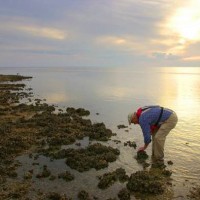Oysters can certainly be a tasty treat and their purported side-effects are legendary, but increased libido is not the only reason to be interested in the future of these little creatures!
Because oysters are big money makers and because we live an era of rampant irresponsibility, these mollusks are facing the very real dangers of over-fishing and “bedding”. These harvesting methods have already destroyed the natural oyster reefs along the East River in New York, according to the NY Times. Similar destruction has plagued the eastern coast of the US & Gulf Coast states where oyster farming and cultivation has been a significant source of income and sustenance since the mid-nineteenth century.
Unfortunately, shortsighted opportunism rarely pays off in the end, and today natural oyster reefs are all but extinct. The lost benefits of these natural systems are vast. The erosion of Florida beaches is an obvious concern around the entire state, but the more subtle ramifications of this lost eco-system include the depletion of natural food sources for many birds and mammals, as well as the loss of naturally occurring ocean purification.
Not only is there damage to the natural ecosystems but without developing industry-wide sustainable oyster harvesting methods, there will eventually be no more oysters to harvest. This will have a profound impact on the economic ecology of states that depend on the income generated by the oyster industry.
While great damage has already been done, these oyster reefs can and are being rebuilt on a small scale in particular regions. While these efforts are encouraging, we must do more. The simplest and most direct way to affect positive change with regard to oceanic preservation is through public awareness and individual responsibility.
What you can do:
The Monterey Bay Aquarium’s Seafood Watch program is a critical resource which regularly publishes and updates lists of oceanic species to avoid, as well as “good” alternatives that are more sustainable and that will limit unnecessary bycatch. The website even provides a link for downloading a smart phone application, allowing convenient access to the information while dining out or shopping for fresh seafood.
Please utilize these invaluable resources to become more aware of the challenges to the natural environment, and be a progressive voice of change within your circles of influence. We are the cause of this destruction, and only we can insist on responsible choices to improve the world in which we live.


Leave a Reply